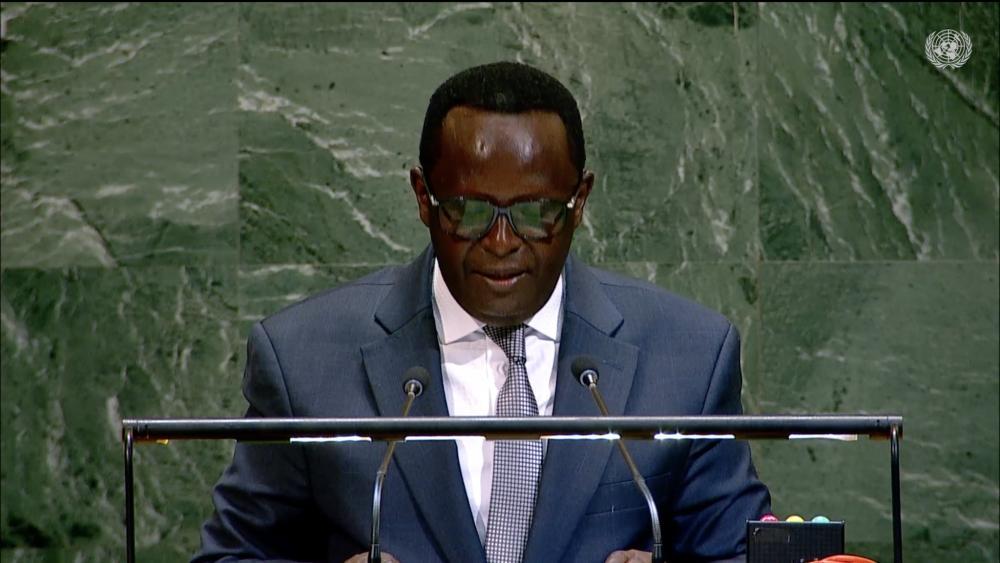Africa-Press – Rwanda. Rwanda’s ambassador to the United Nations Martin Ngoga has urged the international community to build a fairer and more inclusive global sports system, warning that many developing countries remain locked out of meaningful opportunities and visibility within the sector.
He delivered the call on Wednesday, November 19, during the 46th plenary meeting of the 80th session of the UN General Assembly, which discussed Sports for development and peace building.
“Rwanda calls for greater equity and inclusion in the global #sports architecture. Many developing nations remain structurally excluded from opportunity and visibility.
We also underscore the importance of upholding the neutrality of #sports. Politicization does nothing except… pic.twitter.com/HVevjK9NSY
— Permanent Mission of Rwanda to The United Nations (@RwandaUN) November 19, 2025
Reflecting on Rwanda’s post-genocide journey, Ngoga stressed that sports are far more than competition or entertainment. He described them as a diplomatic bridge and a strategic investment in peace.
“For Rwanda, this is not a theory. It is our lived experience,” he said. “A nation that rose from the ashes of genocide understands, more than most, the power of sport to rebuild a broken people, to restore trust, to unite communities, and to inspire a new generation to believe in itself again.”
Amb. Ngoga, who also serves as chair of FIFA’s ethics committee, recalled how, in the fragile years after the 1994 Genocide against the Tutsi, sports played a quiet yet powerful role in Rwanda’s healing.
“At a time when our social fabric was most fragile, it was sports on our hills, in our villages, in our schools, that helped us move from trauma to resilience, from despair to renewed national purpose.”
Ngoga urged member states to recognise sports as a key instrument of preventive diplomacy, particularly as global divisions deepen.
“In a world increasingly divided, where conflicts are multiplying and the trust between nations is eroding, sports remain one of the few global languages capable of lowering tensions and creating common ground,” he said.
He added that sports must be treated as a deliberate peacebuilding tool, not an afterthought. “This is why Rwanda has made strategic and deliberate investments that continue to deliver continental and global impact.”
The diplomat emphasised that global sports systems still favour a few countries. “We call for greater equity and inclusion in the global sports architecture. Many developing nations remain structurally excluded from opportunity and visibility,” he noted.
He called for targeted support in infrastructure financing, technology transfer and capacity building to “level the playing field,” and urged stronger implementation of global frameworks such as the UN Action Plan on Sports for Development and Peace.
Ngoga also pushed for greater investment in inclusive sports development, stating “Rwanda urges greater investment from member states to unlock sports’ full potential as an enabler of the Sustainable Development Goals. This includes scaling up access for women, girls, persons with disabilities, and marginalised communities.”
Highlighting Rwanda’s own model, he pointed to the country’s hosting of major international events such as the Basketball Africa League, its investment in world-class sports facilities and programmes to support vulnerable youth and promote gender equality.
“These are not symbolic actions. These are policy choices grounded in Rwanda’s belief that sport is human capital development and a pathway to dignity, especially for Africa’s youth.”
Ngoga also cautioned against the politicisation of sports. “Rwanda underscores the importance of upholding neutrality of sports. We urge member states to resist attempts to politicise sporting partnerships and collaborations,” he said, warning that such interference undermines progress and disproportionately harms developing nations.
For More News And Analysis About Rwanda Follow Africa-Press






